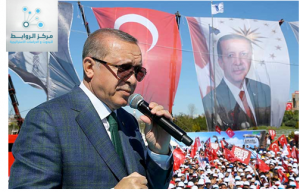After the withdrawal of the United States from the nuclear agreement last May, and the imposition of economic sanctions on Iran that has reached to the level of losing its share of oil in the global market and has no tools to maintain its exports only countries that are expected to compensate the potential shortfall in the offer . Faced with these challenges facing Iran, Turkey’s role emerged as a lifeline for the Iranian economy. In this case Turkey will not miss the golden opportunity offered by the Trump administration because of its tough policies towards Iran to impose its conditions on it to save the Iranian economy from its next predicament.
On the political side, Turkey does not want Iran to take over Iraq alone, so it will ask it to put its mark in the formation of the next Iraqi government, through the accession of some of the Iraqi political figures, and close to the Muslim Brotherhood or close to them. On the security side, given the PKK’s challenge to Turkey’s territorial integrity, Turkey will ask Iran to cooperate with it in the liquidation of this party. If Iran agrees, Turkey will be the economic outlet of Iran. Turkey will also benefit economically from imposing economic sanctions on it. And Trade exchange will be developed in all its forms and preferences will be promoted to Turkey, which will be supplied with oil and natural gas from Iran. In return, Turkey will supply it with all the necessary commodities in its local market.
Turkey After the success of the Justice and Development Party in the legislative elections and the renewal of the Turkish people’s confidence in President Recep Tayyip Erdogan in the presidential elections last month, Erdogan seeks to play a central role in Iraq through the formation of an Iraqi Sunni bloc. This role was supposed to be played by Saudi Arabia. Were it not for the poor performance of former Iraqi ambassador Thamer al-Sabhan and the current “frozen” in the Saudi foreign ministry, al-Sabhan could not come closer to all components of the political process in Iraq and focused his efforts on one spectrum. The result was failure, and the best evidence for that is the results of the parliamentary elections carried out in Iraq last month, the electoral list formed by al-Subhan and provided substantial financial support, this list failed miserably to get even one seat in Iraq. Al-Sbahban was not at the level of the ambition of the Saudi Crown Prince, Prince Mohammed bin Salman, instead of alleviating Saudi Arabia’s problems in the region , he made it worse . The prince was hoping to establish good relations with Iraq, but the former ambassador failed. With this failure , the Saudi role came to an end in Iraq to be replaced by Turkish role strongly Perhaps this role may be welcomed by the United States of America to encircle Iranian influence in Iraq. Turkey, despite strained relations with its former ally and current partner Washington, but it remains a regional power that It is difficult for Washington to overstate its relationship with it.
Turkey in Iraq will not commit the mistakes made by Thamer al-Sabhan. The criterion of friendship and antagonist in Iraq is based on the supreme interests of Turkish foreign policy. It does not consider the affiliation of politicians in Iraq based on the sub-identities “Kurdish, Sunni, Shiite” , bit it sees them as they are Iraqis, and adopt its position on the political and not national or sectarian basis , in the sense that any Iraqi politician supports the PKK is an enemy of Turkey, even if he is a Sunni. Turkey will not accept the presence of Iraqi politicians or deputies speaking in the name of the PKK, which is one of the red lines in Turkish foreign policy.
The bottom line is that Turkey, which is losing its regional role in the wake of what has been termed in the media by the Arab Spring and reflected negatively on it in some of its stations, it may regain its pivotal regional role through economic sanctions against Iran and from one of its main gates, Iraq.
Turkish Studies Unit
Rawabet Center for Research and Strategic Studies

